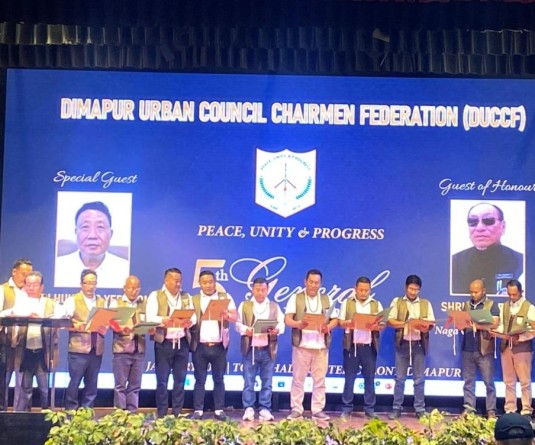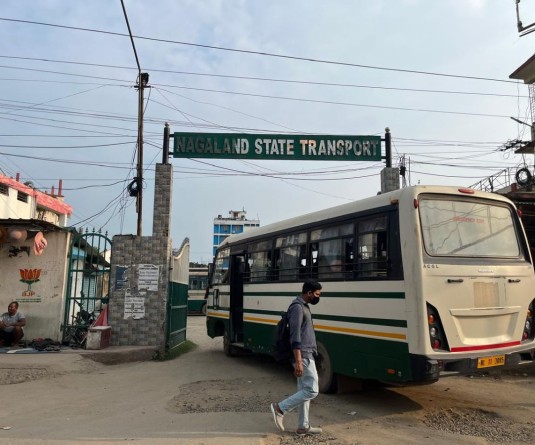Dr Phyobemo Ngully with Manngai H Phom, and students of Tetso College, Yimtiyong Longkumer and Ahyule Keppen during the panel discussion at Tetso College on November 29.
Morung Express News
Chümoukedima | November 29
Dr Phyobemo Ngully, Consultant Psychiatrist and member of Forum for Naga Reconciliation (FNR), today said that the repatriation of the Naga human remains has opened “a door to a kind of mental trauma that our Naga people had suffered.”
Stressing that mental trauma is not for mere talking's sake, he stated that it has wide consequences. “When we look into the Naga history, we know that the Nagas were the only people who resisted the British imperialism for 48 years. We have gone through a history of struggle, militarisation and conflict.” All these experiences have left behind a mental trauma, in the form of “guilt and shame.”
Dr Ngully, who is also a member of Nagaland Medical Council and chairman of Kohima Educational Society was speaking at a panel discussion on “Indigenous Heritage and Decolonization: The Naga Repatriation Journey,” during the ‘Leading Together Dialogues 2023’ hosted by Tetso College.
While maintaining that the discussion on the repatriation of the Naga human remains has gathered different perspectives from the panellists and the moderator, he underscored the underlying issue of mental trauma that affects even the children, and not just parents.
Elucidating that mental traumas can be both intra-generational and inter-generational, he cited a study done in New York on the children of survivors of the Nazi death concentration camp in the second World War, where it found out that the children had high vulnerability towards mental disorders and parents were continuing to suffer from the guilt and shame, with a deep sense of insecurity. The parents' trauma had passed on to their children.
To this end, he said the repatriation process of the Naga ancestral remains has actually opened a new door for the Nagas to “become aware of our mental health.”
“And if we do not address this mental issue, we can continue to suffer from guilt and shame.” This goes on to lower the self-esteem of a Naga individual, and also take away one's confidence to face challenges in an appropriate way.
He said that trauma can be in the form of anger and resentment, which causes trust deficit, doubt and fear in relationships, and which regrettably “is prevailing rather well in today's Naga society.”
When the rest of the Northeast region were shocked to see the Nagas coming together to declare independence on August 14, 1947, a day ahead of the Indian independence day, Dr Ngully said that the situation at present has shifted.” Today, disintegration and fragmentation among the Nagas abound.”
As an Assamese rightly pointed out to him that the culprit is the market force, he lamented that “our young people are no longer interested in our history.” They are no longer willing to go to the roots of what is happening. The market force is playing such a role that “we are getting too distracted, and not giving any attention to our history,” he added.
“This repatriation process has really opened a door for us to have a look at our own history, and at the same time to think about our own vulnerability and insecurity, which has resulted from the inter-generational trauma that we have gone through.” He validated it with neuroscience, which proves that 95% of human behaviour is controlled by one's sub-conscious mind.
Through this dialogue, he was positive that more attention can be given to the perspective of neuroscience, bringing awareness to mental health, which in turn would “bring healing to our people.”
Manngai H Phom, Member of Recover, Restore & Decolonise (RRAD) who moderated the panel discussion also spoke on “repatriation as an ethical exercise: a decolonisation project.” He that the theme of repatriation is not new for Nagaland government, citing the help it has been rendering for the repatriation of the remains of Japanese soldiers.
Phom, who is also a faculty member of Tetso College further shared on the RRAD team’s visit to Mon district of Nagaland and learning about the customary Naga burial system of the Konyak tribe.
Ahyule Keppen, a BA 5th semester, political science student of Tetso College themed her talk, ‘My Personal Growth with Repatriation.’ She shared about how the ‘Leading Together Dialogues’ in 2022 and the Morung Lecture XVIII, where the panellists had a discourse on 'A Conversation on Repatriation: Histories of Loss and Renewal of Hope' served as the catalyst for her decision to pursue research on repatriation. Now, the process holds immense significance for a young person like her, as it allows her to retrace her origin, identity and dignity.
Yimtiyong Longkumer, BA 5th semester history student of Tetso College also shared about his repatriation journey tracing it back to the Morung Lecture XVIII which was held on December 6, 2022. He mentioned how the discussion ignited a flame of inquiry and curiosity within him, prompting realization towards the path of repatriation which is needed to begin with a closer look at the awareness levels among students. This spurred him to conduct a survey among his peers in the college, the findings of which he shared in his talk.
The discussion ended with a question and answer session with special participation from Dr Dolly Kikon and Dr Aküm Longchari, followed by concluding remarks and overall observations by Neha Borogaon, TISS Guwahati and Satyam Rathod, SPPU.





